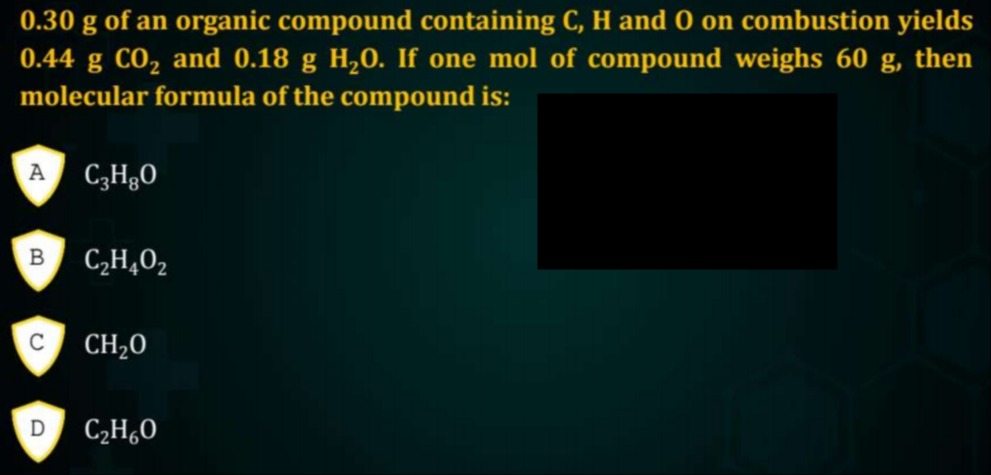Question
Question: 0.30 g of an organic compound containing C, H and O on combustion yields 0.44 g CO$_2$ and 0.18 g H$...
0.30 g of an organic compound containing C, H and O on combustion yields 0.44 g CO2 and 0.18 g H2O. If one mol of compound weighs 60 g, then molecular formula of the compound is:

C3H8O
C2H4O2
CH2O
C2H6O
C2H4O2
Solution
The problem provides the mass of an organic compound containing C, H, and O, and the masses of CO2 and H2O produced upon combustion. We are also given the molar mass of the compound. We need to determine the molecular formula.
Step 1: Calculate the mass of carbon and hydrogen in the organic compound from the combustion products.
Mass of carbon in CO2 = (Mass of CO2) * (Molar mass of C / Molar mass of CO2)
Molar mass of C = 12.011 g/mol, Molar mass of CO2 = 44.009 g/mol.
Mass of C = 0.44 g * (12.011 / 44.009) ≈ 0.44 g * (12/44) = 0.12 g.
Mass of hydrogen in H2O = (Mass of H2O) * (Molar mass of 2H / Molar mass of H2O)
Molar mass of H = 1.008 g/mol, Molar mass of H2O = 18.015 g/mol.
Mass of H = 0.18 g * (2 * 1.008 / 18.015) ≈ 0.18 g * (2/18) = 0.02 g.
Step 2: Calculate the mass of oxygen in the organic compound.
Mass of O = Mass of compound - Mass of C - Mass of H
Mass of O = 0.30 g - 0.12 g - 0.02 g = 0.16 g.
Step 3: Calculate the moles of each element.
Moles of C = Mass of C / Molar mass of C = 0.12 g / 12.011 g/mol ≈ 0.01 mol.
Moles of H = Mass of H / Molar mass of H = 0.02 g / 1.008 g/mol ≈ 0.02 mol.
Moles of O = Mass of O / Molar mass of O = 0.16 g / 15.999 g/mol ≈ 0.01 mol.
Step 4: Determine the empirical formula.
Find the simplest whole number ratio of the moles of each element.
Moles of C : Moles of H : Moles of O ≈ 0.01 : 0.02 : 0.01
Divide by the smallest number of moles (0.01):
Ratio = 1 : 2 : 1.
The empirical formula is CH2O.
Step 5: Calculate the empirical formula mass.
Empirical formula mass of CH2O = 1 * Molar mass of C + 2 * Molar mass of H + 1 * Molar mass of O
Using approximate values: 1 * 12 + 2 * 1 + 1 * 16 = 12 + 2 + 16 = 30 g/mol.
Using more precise values: 1 * 12.011 + 2 * 1.008 + 1 * 15.999 = 12.011 + 2.016 + 15.999 = 30.026 g/mol.
Step 6: Determine the molecular formula.
The molecular formula is (Empirical formula)n, where n is a whole number.
Molar mass of molecular formula = n * (Empirical formula mass)
Given molar mass of the compound is 60 g/mol.
n = Molar mass / Empirical formula mass = 60 g/mol / 30 g/mol = 2 (using approximate values).
Using more precise values: n = 60 g/mol / 30.026 g/mol ≈ 1.998 ≈ 2.
The molecular formula is (CH2O)2 = C2H4O2.
